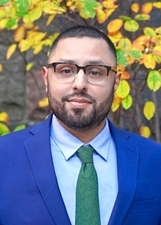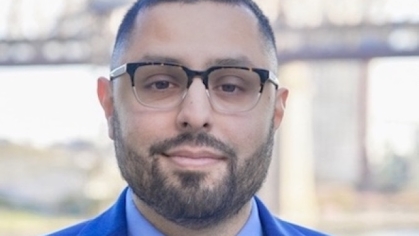Dr. Gabriel Robles (he/él) is a clinical social worker, assistant professor at the School of Social Work and the Chancellor's Scholar for Inclusive Excellence in Sexual and Gender Minority Health at Rutgers. Dr. Robles conducts research focused on substance use prevention and sexual health among sexual and gender minorities (SGM) with a strong interest in addressing health inequities among Latinx SGM populations. He examines how cultural values, institutional and interpersonal support, and intersecting identities can serve as resiliency factors in mitigating negative health outcomes. Dr. Robles additionally examines the role that family and romantic/sexual partners play in the health and wellbeing of sexual and gender minorities.

Tell us about one specific article or dissemination effort that relates to DEI that you’ve worked on recently.
I have a series of articles published on the experiences of sexual minority men (SMM), including Latino/x SMM. These articles highlight the role that enacted stigma (e.g., discrimination) plays on the health and well-being of SMM in the U.S. These articles also highlight the importance of supporting communities impacted by intersectional stigmas such as heterosexism, racism, and, nativism/ xenophobia, among others.
Robles, G., Dellucci, T. V., Gupta, S. K., Rosenthal, L., & Starks, T. J. (2022). Identity and relationship-based discrimination, and mental health in a sample of sexual minority male couples. Journal of Gay & Lesbian Mental Health, 26(1), 76-97.
Robles, G., Hong, C., Yu, M., & Starks, T. J. (2021). Intersecting communities and PrEP uptake among US-based Latinx sexual minority men. Journal of Racial and Ethnic Health Disparities, 1-7.
Robles G, Bosco SC, Cardenas I, Hostetter J, Starks TJ. (2022). Psychosocial and culturally specific factors related to intimate partner violence victimization among a sample of Latino sexual minority cis men in the U.S. Journal of Interpersonal Violence. E-Pub.
Why did you work on these articles?
I wrote these manuscripts because of my personal experiences with issues related to intersectional stigma but also my work in clinical social work in which clients would continuously set aside issues related to internalized homophobia and instead focus on the way their family and community members make disrespectful comments towards them for being queer and Latino/x.
I additionally conducted these studies because I started to notice that people seem to rely on specific support systems based on the issue at hand. Even among partnered individuals, it appears that community and other social support systems are still vital to the mental health and wellbeing of the partners.
How does it connect with the principles of IIDEA?
In these works, we begin to contextualize the experiences of Latino/x SMM while living in a white Eurocentric setting. Providing this context is important as the field moves towards using interventions that are designed for and endorsed by Latino/x SMM. In my opinion, the burden lies on social work investigators to ensure that the interventions are appropriate. In practice, we often rely on clients to voice their concerns about the intervention, but by this time it’s often too late. We need to engage community partners from the inception of the idea through to dissemination.
What are the implications of your work for social policy, practice, or research?
My work is highly relevant to social work practice. Many of the processes that we discuss in the therapy room with clients often stem from structural issues. The day in which psychotherapy is solely based on diagnosing and providing treatment as usual is over. We need to make sure we are using treatment methods that don’t inadvertently perpetuate the status quo.
My work is important to social policy given that there are countless anti-LGBTQ+ state bills waiting to be passed. It is important now, more than ever, to ensure that LGBTQ+ people of color are centered in those contexts given that people of color often face the more dire circumstances when policy fails people.
What is the value of this work? Why is it important?
This work centers the experiences of Latino/x SMM, and other LGBTQ+ persons as well, as an important aspect of the U.S. experience. The work specifically moves the burden of intersectional stigma away from the socially vulnerable and situates it within a larger socio-cultural structure that continues to deny the existence of these people – my peoples.
This story was created in partnership with Rutgers School of Social Work's Inclusion, Intersectionality, Diversity, Equity, and Advancement (IIDEA) Committee in support of our commitment to diversity, equity, and inclusion.



